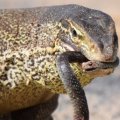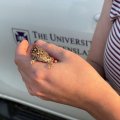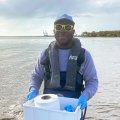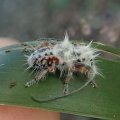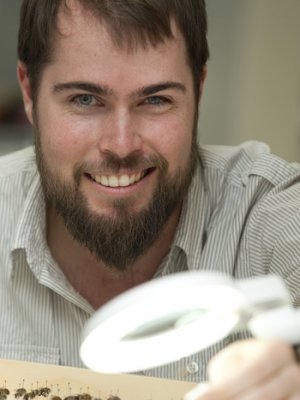
A childhood interest in bees has resulted in the receipt of a prestigious Queensland-Smithsonian Fellowship for a PhD student from The University of Queensland (UQ), Tobias Smith.
The fellowship, which was announced by Queensland Premier Anna Bligh at a conference in Washington earlier this week, and valued at will allow Mr Smith to further pursue his research on the diversity patterns of bees and flies in tropical rainforests areas, at Smithsonian Research Centres in North and Central America.
The Smithsonian is the world’s largest museum and research institution comprising 19 museums, the National Zoo in Washington and nine other research organisations.
Mr Smith is researching pollinator communities in Far North Queensland and exploring the impacts of habitat fragmentation and other landscape change. He has already collected a comprehensive data set on bees and flies during six months of surveys on the Atherton tablelands and aims at highlighting the significance of these insect communities in Queensland’s tropics.
Receiving the fellowship will enable Mr Smith to travel to Panama later this year to work at the Smithsonian Tropical Research Institute with Dr David Roubik, a world expert on tropical bees.
“There are about 2000 bee species native to Australia and an estimated 30,000 different species of flies. Pollinators, such as bees and flies, play an integral role in the functioning of our ecosystems and yet we know little about their communities in the Australian tropics, or how these communities respond to landscape change,” Mr Smith said.
“The bulk of existing research stems from Central America, so I intend on using Panama as a source of reference communities, with which I will compare diversity patterns of Australian bee and fly communities, to find out more about what might be unique in the way our rainforest ecosystems operate.”
Mr Smith will collect samples from rainforests and farming landscapes in Panama and compare these with data he has collected from Far North Queensland.
Mr Smith said there was a tendency to overemphasise the similarities between tropical regions around the world.
“This will be one of the first studies to do a direct comparison of the structure of pollinator communities between the two continents and identify some of the key similarities and differences,” he said.
The fellowship will also provide Mr Smith the opportunity to work with leading fly expert, Dr Christian Thompson at the Smithsonian Museum of National History in Washington.
“People often overlook flies as pollinators and one element of my research will be to determine whether flower-visiting flies are more abundant in Australian tropical rainforest ecosystems than in other areas,” Mr Smith said.
Having completed his undergraduate degree in Tasmania in the area of plant ecology, it was his childhood fascination with bees and his interest in ecology that led him to a research degree at UQ.
“I was interested in conducting research on bees and pollination and wanted to work with Dr Margie Mayfield, who is a widely experienced community ecologist with an international reputation,” said Mr Smith.
“I had heard about the Queensland-Smithsonian Fellowship a couple of years ago, and was interested in the potential for broadening the scope of my research. However, I only decided to apply this year after Dr Mayfield and other members of my advisory team encouraged me to do so. I didn’t really imagine that I would actually be successful.”
With his research, Mr Smith hopes to assist people to better understand the importance of Australian rainforest areas, pollinators, and the significance of human interactions with natural ecosystems.
“Pollination is a critical ecosystem process, and an important ecosystem service. We rely on pollination to maintain natural ecosystems as well as to enable crop production. The changes that we are making to landscapes around the world have the potential to have serious implications for pollinator communities, and pollination systems,” Mr Smith said.
“Society derives a number of economic benefits from healthy, functioning ecosystems. We need to better understand how human practices are affecting communities that are directly involved in vital ecosystem processes, such as pollinator communities, so that we can ensure that these ecosystems continue to function into the future.”
UQ’s research higher degree programs include the Doctor of Philosophy (PhD) and Master of Philosophy (MPhil). If you are interested in finding out more about research opportunities at UQ, contact the Graduate School UQ Advantage team at uqadvantage@gradschool.uq.edu.au or phone 07 3346 0508.
Media: Mr Tobias Smith, mobile 0428 363 512, email Tobias.smith@uqconnect.edu.au; or Dr Jessica Gallagher, UQ Graduate School, (07) 3346 0508, email j.gallagher@uq.edu.au
Notes to the editor
About the UQ Graduate School
A Doctor of Philosophy (PhD) is one of the highest degrees that can be awarded. It is an advanced academic qualification seen as a requirement for the majority of academic and research positions. PhD students conduct a research project, generally over a 3 to 4 year period, which involves formulation and identification of a significant problem, development of conceptual and methodological skills, and contribution of new knowledge.
A Master of Philosophy (MPhil) is also a postgraduate research degree involving a significant project, which requires students to develop and enhance analytical and research skills through independent investigation. Usually conducted between 15 and 18 months, students develop specialist knowledge.
A PhD or MPhil can be completed in any field; from arts to social science, to nanotechnology or sustainable development.
Research higher degrees allow greater opportunity and choice, enable the pursuit of altruistic endeavours, enhance career focus, and create the next generation of innovators.
Over 4,000 students are undertaking a research degree at UQ are supported by the UQ Graduate School which focuses on enriching the quality of academic life; providing high standards of supervision, and assisting RHD students throughout their degree and in career opportunities in academia, industry, or government.
The Graduate School coordinates year-long Skills Training programs, Graduate Student Week events, an annual Three Minute Thesis (3MT™) competition, and research commercialisation training.
UQ has supported over 13,000 students to complete their research degree.


